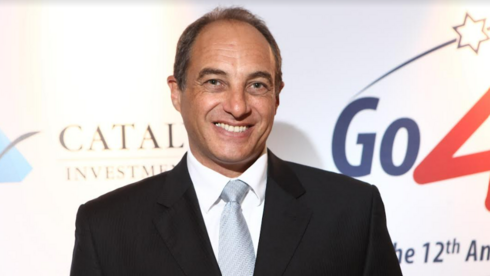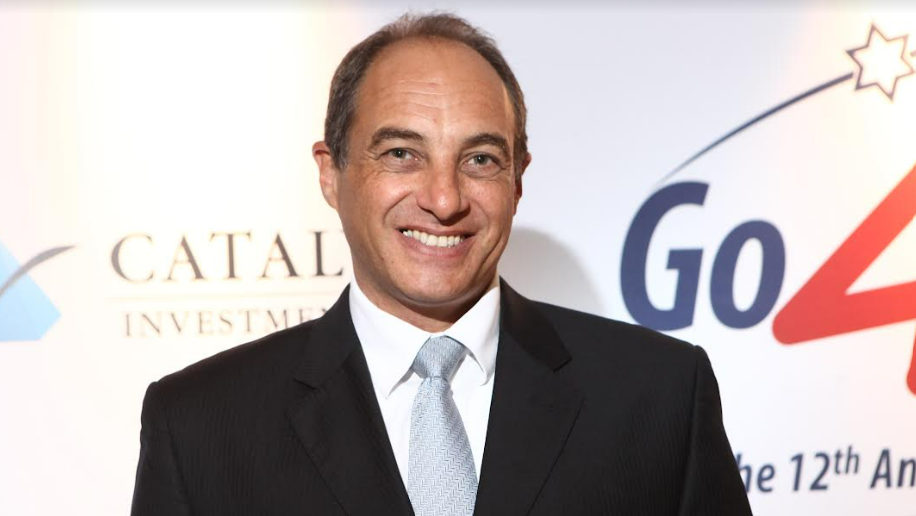
2024 VC Survey
Two main factors preventing Israeli high-tech from bouncing back
Edouard Cukierman, Managing Partner at Catalyst Funds, joined CTech for its 2024 VC Survey series to share some challenges still faced by Startup Nation amid war.
“Since being founded 24 years ago, Catalyst has gone through Lebanon’s second war, Tzuk Eitan, the global financial crisis of 2008, and many more challenging times,” said Edouard Cukierman, its Managing Partner. “These times influence foreign investors' behavior regarding investment risks.”
Cukierman joined CTech to share concerns for the Israeli high-tech scene as the war with Gaza rages on through 2024. Despite more optimism now than a few months ago, challenges remain.
“Investors are now more optimistic again. But convincing them is made even more difficult by two other factors: The first is the limited travel options. Fewer investors are venturing into Israel these days. Added to this is the polarized perception of the conflict abroad, which makes doing business more difficult, as not everyone is still united on Israel's side.”
VC fund ID
Name of the funds: Catalyst (Catalyst IV, Catalyst-CEL, Catalyst II, and Catalyst I)
Total assets: $450m AUM
Leading partners: Edouard Cukierman, Yair Shamir, Boaz Harel, Luc Muller, Lisya Bachar-Manoah, Ariel Anati.
Latest investments in Israel: Addionics, Nexar, Pulsenmore, Curalife
Selected portfolio companies: Mobileye (Exited), Tufin (Exited), Taboola (current), Addionics (Current), and Nexar (Current)
From your perspective, was 2023 a ‘lost year’, or can the events that happened during it be seen as a springboard for opportunities in 2024?
From our perspective, we see great opportunities in 2024, as tough as the events in 2023 were for the Israeli tech ecosystem, Catalyst believes in the Israeli tech and founders. This belief comes from the Israeli mentality, that we can get stronger from these events rather than weaker. However, the founders need to understand that valuation has dropped significantly and that the next rounds will be with lower funding and lower valuation. The key from our point of view is to survive these times and become profitable for the next 2 years with a business plan with a smaller/bridge round.
What do you believe is more crucial to the state of Israeli tech: the influence of global processes and the global economy, or the local events ranging from the political protest to the war state?
If we look at it from numerous perspectives, we can see a clear correlation between the increase in rates drop in valuation, and less interest from investors to invest in a riskier environment. However, the local political protest and the war state are causing more than just financial influence: i.e. employees are part of the reserve duties meaning less manpower. Yet, there is still plenty of dry powder in the Israeli investment sector which will need to be converted into action soon.
Has the prestige of Israeli high-tech been damaged, or are the protests and the war merely a 'small bump in the road' from which the sector can recover within months?
The Israeli high-tech has delivered and will continue to deliver, and if the leaders of our unique ecosystem will continue to do so, its prestige won’t be damaged. We will see companies cutting costs, layoffs, and potential down rounds. However, the product from the Israeli high-tech is still unique and can maintain its status due to the innovators and the work attitude of the Israeli high-tech.
How much effort was required of you to maintain the fund's status with your investors in 2023? What were their primary concerns and how did you address them?
Since being founded 24 years ago, Catalyst has gone through Lebanon’s second war, Tzuk Eitan, the global financial crisis of 2008, and many more challenging times. These times influence foreign investors' behavior regarding investment risks. Investors are now more optimistic again. But convincing them is made even more difficult by two other factors: The first is the limited travel options. Fewer investors are venturing into Israel these days. Added to this is the polarized perception of the conflict abroad, which makes doing business more difficult, as not everyone is still united on Israel's side.
How are you preparing for the most pessimistic scenarios, such as the continuation of the war in Gaza deep into 2024, the opening of another front in the north, or further reduction of government support for high-tech?
The unstable situation has clearly determined to think about different mitigation plans for these events. As of now, we are actively looking to invest and support deeply our portfolio companies. As one of the oldest active funds here in Israel and with the extensive experience we bring to the table, our help is critical.
Did you raise fund money in 2023 for an existing fund or a new one? What are your expectations regarding this matter for 2024?
Catalyst closed the fourth fund – CIV in July 2023. Bringing Catalyst's total to $450 million assets under management. We already invested in five companies: Curalife, Addionics, Nexar, Arbe, and Pulsenmore. In that matter, we are actively looking to invest from our fourth fund during 2024, mainly in Cybersecurity, Deeptech, Mobility, and more.
In your view, will the amounts and/ or the number of deals in 2024 be more like those of 2023 or 2021-22?
2021-22 was an outlier in terms of invested capital/number of deals, these numbers were the peak of the recent upcoming time. However, we can see that the numbers from mid-’22 until mid-’23 are closer to 2020. If 2023 was such a difficult year with such an amount invested, considering that we believe 2024 will be even better.
Which high-tech sectors will you focus on in the upcoming year? Which areas will maintain their prominence, and which ones appear less attractive?
Cybersecurity, Deeptech, Mobility, Climatech, and Renewable Energy are our go-to sectors. The area that will maintain its prominence is cybersecurity. Israel has positioned itself as a tier-1 cybersecurity expert, and it is shown by recent M&A deals in 2023, we expect it to be the same in the upcoming year. We wouldn’t say there is a specific area less attractive as it is more about the company’s performance and leadership in the right direction.
Which type of companies stand a better chance of garnering increased attention from VC funds this year - early-stage or advanced rounds?
I think most of the attention will be on later-stage companies, we know more and more companies in these stages actively looking to raise capital soon since their cash is running out. Another reason is the lower valuation with the high dry powder in the market, different VCs will need to invest soon as some did only follow-on investments. Knowing that, we might see more VCs drawn to later and less risky stages of investment.
What changes will you implement in your approach to evaluating investments in startups in the coming year, compared to the previous two years? What practices will you abandon, and what criteria will you now demand from founders?
Catalyst has sharpened its investment thesis in those tougher and unstable times. We demand execution and a doable business plan by the management team while reaching profitability. Another big move is Catalyst’s Investors Club (CIC), a cutting-edge platform that enables private investors worldwide to invest and get exposed to Israeli high-tech startups and to be able to invest alongside the finest funds of Israel. CIC brings an opportunity to the Israel-supporter investor, to invest in opportunities without the need to be present physically, while the timing is great to invest while the Israeli startup ecosystem is in crisis.
Do you think it is likely we will witness encouraging IPOs, the emergence of unicorns, or remarkable exits in 2024?
Yes, the Israeli ecosystem has great companies that will continue to grow in all different conditions. As always there are incredible companies that will be able to deliver – growth in sales or becoming profitable, will show investors that the company is maturing and ready for the next step. We know there is potential for new unicorns/exits in 2024.
Provide an example of an intriguing investment you made in 2023. What sets this company apart, or what is distinctive about its sector?
As for 2023, Catalyst invested in Addionics, Nexar, Arbe, CuraLife, and Pulsenmore. Catalyst finds Addionics solution from tech to management the difference maker in this sector. The electric vehicle (EV) changeable battery industry is the next big thing as the rise in EV popularity increases, the solution with the car’s battery needs to upgrade as well.
Practical and current tips for founders planning upcoming money-raising efforts - focus on the current market environment and sentiments.
- Understand the market conditions.
- Core business plan for 2024-2025, showing the needs and activity in a realistic projection.
- Showcase the client’s ROI from your product and why it is a must and not just a nice to have.
Name two portfolio companies that you think will thrive in 2024:
Addionics
Sector + description of the product: Energy, creating the next generation of energy storage for electric vehicles by focusing on battery physics and are enabling higher energy density, lower charging time, and improved heat safety.
Investment amount: Catalyst co-lead the $27M round A of the company
Founders + year of establishment: Founded in 2017 by Ph.D. Moshiel Biton, Ph.D. Vladimir Yufit, and Ph.D. Farid Tariq, Addionics has production facilities in the U.S. and Israel, along with sites in the UK and Germany.
Reasoning why this is their year:
The current energy market is booming, intending to become a market leader in the segment, Addionics just announced a planned $400 million investment into its U.S. manufacturing facilities as part of a multi-year roadmap to support domestic EV battery production. Once completed, the factories will generate 3D copper foils to support 90GWh of battery capacity a year.
CuraLife
Sector + description of the product: Healthcare, CuraLife develops, manufactures, and distributes a natural supplement for diabetes named CuraLin. CuraLin, differently than other diabetes supplements, presents an instant effect on glucose levels from the first day, while competitors have a delayed effect of several weeks or months.
Investment amount: Catalyst invested in CuraLife via Primary and Secondary rounds
Founders + year of establishment: Ron Elul, 2013
Reasoning why this is their year: The global diabetic population is growing rapidly. Awareness of a healthy lifestyle, fitness, and routine testing will have an additional positive effect on the diabetes market. CuraLife is the only supplement company that has created a full ecosystem surrounding its product.













